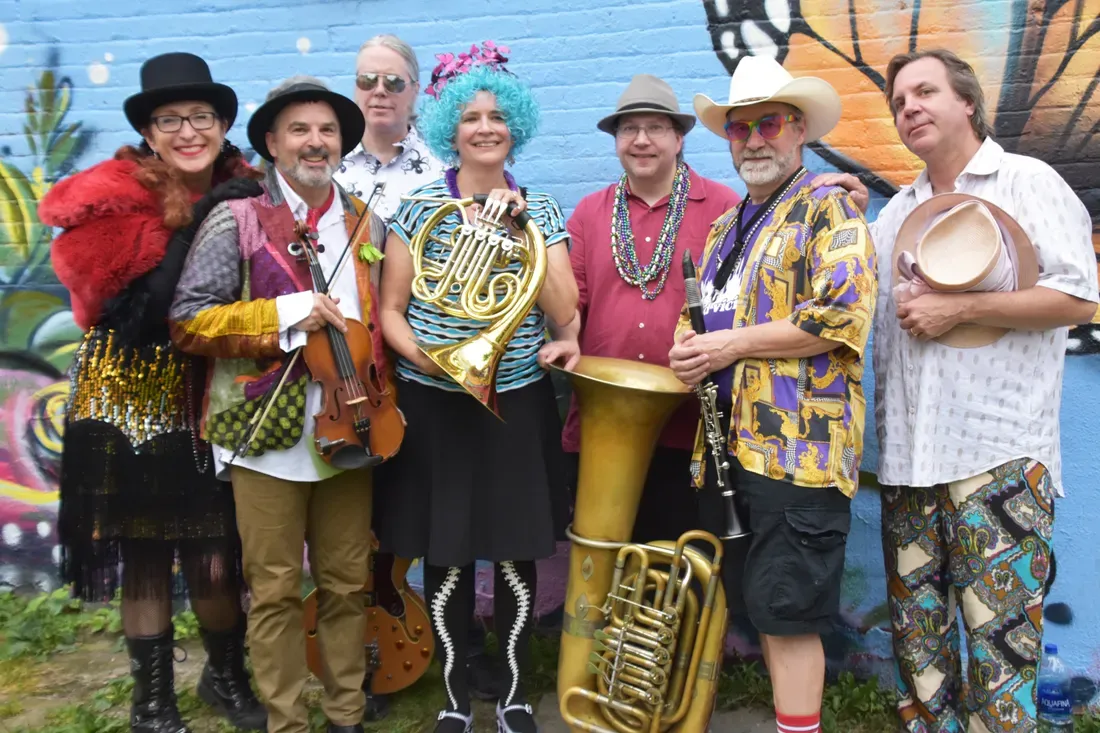Shabbat Gathering: Klezmer and the end of the beginning.

Dear Chevra, as is our custom, we will gather tonight at 5.45p ct to welcome Shabbat. These are the coordinates:
Zoom
Meeting ID: 963 5113 1550
Password: 1989
Phone: +1 312 626 6799
(To unsubscribe from the newsletter, click the link at the bottom of this email.)
Here we go.
As part of my personal Ashkenaz renaissance, I've been listening to more klezmer and more modern klezmer as part of the bargain. Klezmer covers a variety of moods: from joyful dancing to the blues. For me, there's a klezmer tune for every mood.
If one looks up klezmer on Wikipedia, (and I did) there are precious few dates for it's beginnings. That's because, like most things regarding music, change happens slowly, especially across a variety of lands and decentralized cultures. And all undocumented. Klezmer, like Yiddish, draws from a multitude of sources but seem to coalesce around the early 19th century in Eastern Europe when klezmer musicians started turning professional.
Where did it come from?
From The Maxwell Street Klezmer Band website:
The advent of the Chassidic movement in the 1750s stocked the klezmer's pot with an endless supply of melodies and dances based on nigunim (wordless prayer melodies). The style of the performance became impassioned and soulful, reflecting the spirituality of the Chassidim.
While "klezmer" referred originally only to instrumental music played by clarinets, violins, basses and tsimbaloms (hammer dulcimers), it has come to mean Yiddish vocal music as well, encompassing both folk songs and music from the Yiddish theater, which thrived in the early 20th century in both Warsaw and New York.
Note: The Maxwell Street Klezmer Band was in the 4th of July parade in Highland park. In many of the videos from that horror, crowds can be seen rushing past the band when the shooting breaks out.
Rather than write about the music that is so dear to me, I'm sending you a wide variety of klezmer, from the traditional to the electric. Enjoy!
Marty Levitt, King of the Klezmers.
Marty Levitt, King of the Klezmers, played "traditional" klezmer in the big band style. Levitt and his band played at my wedding at Congregation Beth Elohim in Brooklyn, honest. Levitt (clarinetist) split his time between NYC and Florida in his later years and we were lucky to get him while he was in NYC in December. Levitt and his band rocked the room. Everybody danced and danced.
Andy Statman, David Grisman.
In 1995, Andy Statman (clarinet) and David Grisman (mandolin) pretty much kicked off the klezmer revival with their album, Songs of Our Fathers. Based on traditional songs, the album was, and still is, a touchstone contemporary klezmer music.
Brivele.
Brivele is a member of the klezmer new age. Three women; a violin, accordion, and banjo; play punk / protest Yiddish folk music and klezmer. Below is their a cappella Yiddish rendition of Bread and Roses, not klezmer, but a favorite in the political circles I run in these days.
Here's one from Brivele that's a bit more traditional in that it too is a protest song.
The Puskin Klezmer Band
The Pushkin Klezmer Band is a modern klezmer / Roma band from Kiev. More traditional style, the six-piece band sticks with the classics.
Forshpil.
I could try all day long to describe Forshpil and never come up with anything as good as how the band describes itself: "Sounds like: Pink Floyd meets The Doors at Janis Joplin’s Bas Mitsve." Decide for yourself.
Yid Vicious.
It would be criminal of me to write a round-up of klezmer bands and omit Yid Vicious, Madison's best klezmer band. Afterall, Yid Vicious played at our synagogue's 30th anniversary celebration. And, it's the only klezmer band I've come across that includes a French Horn and a Theremin.
Coda.
I hope you've heard something you love in the selections above, and I hope you'll explore more klezmer. Maybe, like me, listening to more klezmer is a good thing.
And may it be for all of us a blessing.
See you tonight!
Gut Shabbos!
All my love,
brian.
PS - Production Note / Explanation: A couple of the links I've shared above are from Spotify. Among other things, Spotify is the biggest outlet for podcaster Joe Rogan and he's a nogoodnik. Neil Young and Joni Mitchell announced a boycott of Spotify because of Rogan and I dropped my subscription like a hot rock when I heard that. I have a deeper relationship with Young and Mitchell than I do with Spotify. I switched to Tidal. My production issue is that I can't embed Tidal links in this newsletter platform and I want you to be able to hear this music. So, I apologize for the Spotify links. Whenever possible, I grabbed links from SoundCloud. Sample the music and then listen to it on any other platform as long as it's not Spotify. OK? Thanks.